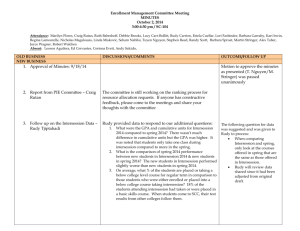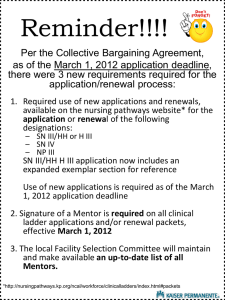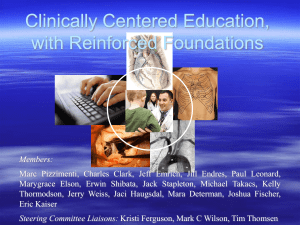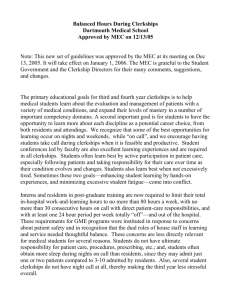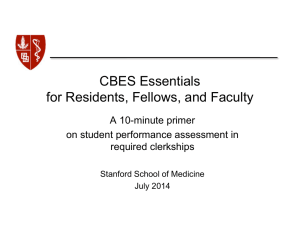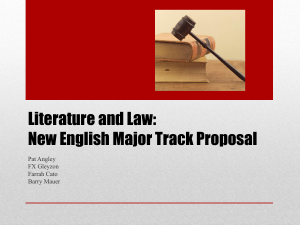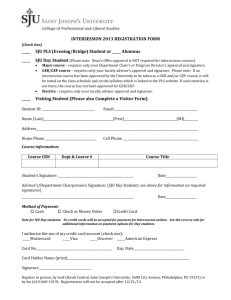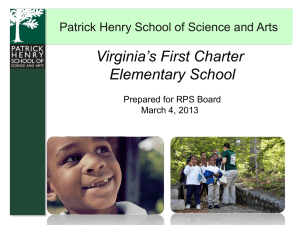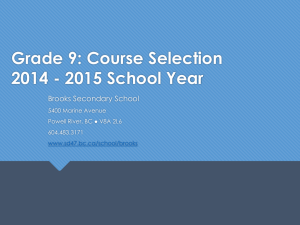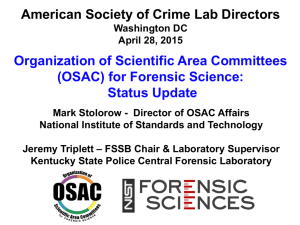View the presentation here. - University of Iowa Health Care
advertisement
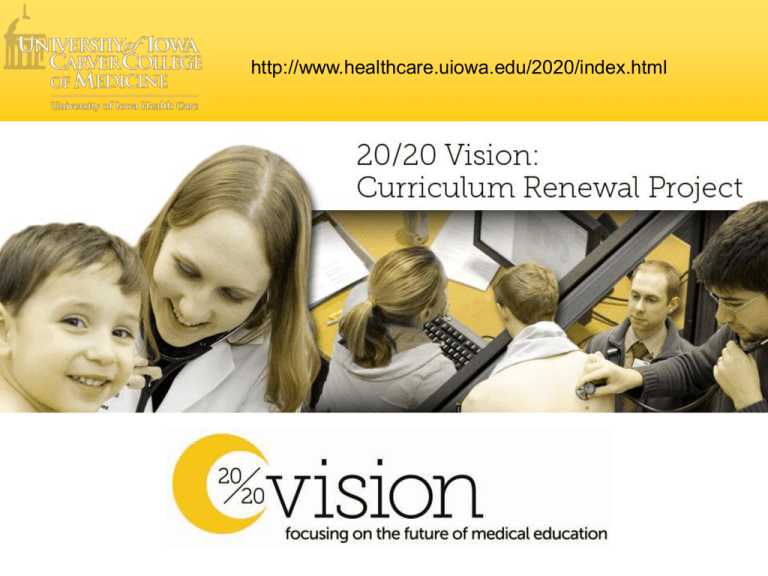
http://www.healthcare.uiowa.edu/2020/index.html Take Home Points • The Carver College of Medicine provides an outstanding medical education • There is room for improvement (and always will be) • We are committed to continued development of the best possible medical education and learning environment Aim of CCOM Medical Education • To provide an educational foundation that prepares graduates for entry into a GME program of their selection, including whether to pursue a career as a clinician, scientist, and/or educator. 1995 Curricular Revisions • Many excellent changes: - Some new & integrated & centrally managed courses - Some new clerkships & adjustments in clerkship time • Learning environment enhanced by investment in facilities, course management and student services Outstanding Results • Pass rates for USMLE examinations excellent (97-100%) • <1% academic attrition over last decade • Excellent student satisfaction scores on AAMC Graduation Questionnaires • High level of satisfaction with IA graduate performance in residency programs Case for Curriculum Renewal Growing Disconnections • ~ 80% of medical education focused on biology yet 60% of premature deaths due to “non-biologic” factors • ~ 80% of clinical education occurs in inpatient settings yet 80-90% of medicine practiced in outpatient arena • Sub-cellular/molecular focus of scientific inquiry presents a growing challenge for basic science faculty to demonstrate its broad applicability to clinical medicine Growing Disconnections Year Step 1 Step 2 (# Topics < X) (# Topics < X) 04 2/20 3/22 05 2/20 5/22 06 4/20 3/22 07 5/20 4/22 08 8/20 7/22 09 14/20 6/22 Case for Curriculum Renewal • Growing Disconnects • Exponential ↑ in knowledge • Changing environment – Societal demographics – Health care reform • Technologic advances – Availability and management of information – Methods of delivering curriculum Case for Curriculum Renewal • LCME Report identified: – a need for the CCOM to review its entire curriculum (ED-35) – a need for greater central oversight for the curriculum (ED-33) • Dean Rothman’s charge to systematically review, revise and implement a renewed undergraduate medical education curriculum for the CCOM Steering Committee Charge • Develop a framework for curriculum renewal • Support modeling committees by providing information and resources • Synthesize modeling committees’ work into a consensus curriculum • Work with departments to define core knowledge for a broad-based medical education • Communicate progress to the larger CCOM educational community Modeling Committee Charge • Design an educational structure that will – address patient and societal needs that are anticipated to significantly impact healthcare in the near future – improve integration of basic, clinical, and social sciences within and across all four years – provide earlier clinical experience and appropriate skill development – promote learner-centered education, student wellbeing, engagement, and active learning Curriculum Renewal • Convened Steering Committee - 11/09 • Charged 4 modeling committees to develop a proposed new curriculum - 4/10 • Held retreat to present the 4 models - 9/10 http://www.healthcare.uiowa.edu/2020/committees.htm • Gathering feedback on curricular themes of models (today) Modeling Committee Chairs Modeling Committee Members Bridge to the 21st Century 2M: Two Metaphor Education Reciprocal Integration Nancy Rosenthal, Chair Pathology George Bergus, Chair Family Medicine Vincent Liu, Chair Dermatology Clinical Centered Education with Reinforced Foundations Marc Pizzimenti , Chair Anatomy/Cell Biology Manish Aggarwal, Medical Student JoAnn Benda, Pathology Jason Anderson, Medical Student Charles Clark, Orthopaedic Surgery Brandon Alleman, Medical Student Allison Boardman, Medical Student Rick Axelson, OCRME Mara Determan, Medical Student Jill Bowman, Medical Student Amy Dowden, Internal Medicine Donald Brown, Internal Medicine Joseph Chen, Orthopaedic Surgery Randy Grout, Medical Student Paul Christine, Medical Student Mary grace Elson, Obstetrics/Gynecology Jeff Emrich, OSAC Eve Clark, Radiology Collin Kreple, Medical Student Sarah England, Physiology/Biophysics Jill Endres, Family Medicine Kristen Gerjevic, Medical Student Linda Madson, Psychiatry Daniel Fox, Medical Student Joshua Fischer, Medical Student Hans House, Emergency Medicine Nick Pantazis, Anatomy/Cell Biology Michael Haugsdal, Medical Student Jaci Haugsdal, Medical Student Janna Lawrence, Hardin Library Benjamin Reinking, Pediatrics Eric Kaiser, Medical Student Frances Meyer, Internal Medicine Penny Rembolt, OSAC Darren Hoffmann, Anatomy/Cell Biology Sobia Khaja, Otolaryngology Jeff Pettit, OCRME Adrienne Samar, Medical Student Jeff Murray, Pediatrics Erwin Shibata, Physiology/Biophysics Peter Rubenstein, Biochemistry Amal Shibli-Rahhal, Internal Medicine Jack Stapleton, Internal Medicine Kate Thoma, Family Medicine Deborah Segaloff, Physiology/Biophysics Jane Viner, Medical Student Mark Smith, Radiation Oncology Michael Takacs, Emergency Medicine Teri Thomsen, Neurology Linda Walton, Hardin Library Sonia Sugg, Surgery Kelly Thormodson, Hardin Library Robert Yang, Orthopaedic Surgery Liz Takacs, Urology Jerry Weiss, Internal Medicine Christine Ziebold, Pediatrics Gerry Wickham, OSAC Ann Willemsen-Dunlap, Anesthesia William Zeitler, OSAC Paul Leonard, Anesthesia Emerging Themes from Curricular Models • Greater integration of basic/clinical/social sciences across 4 years – Sub-cellular/molecular focus of scientific inquiry makes collaboration between basic science and clinical faculty even more important • Organizing themes or principles – Conceptual organization of knowledge leads to better learning • Earlier clinical exposure – Models suggest ambulatory experience, which more accurately reflects delivery of care • Individualized educational programming – Current curriculum is more structured than most Greater Integration Across 4 Years •Interdisciplinary courses/clerkships •“Linking” courses •“Blocked” Clerkships • Foundations course •“Threads” or “themes” across all 4 years •Recurring short courses/seminars •Team teaching/collaboration Greater Integration • Clinical expertise linked to a well organized knowledge – Knowledge organized into schemes – 2+2 curriculum imposes discipline-based knowledge as organizing scheme • Educational research supports providing conceptual structure of the content to be learned – Greatest value for students experiencing difficulty in seeing how concepts relate to one another Potential Curricular Structures • Discipline based (current) • Organ based • Complaint based • Mechanism of disease based Earlier Clinical Exposure • Continuity of care experience • Start clinical exposure earlier Individualized Learning • Greater variety of clerkship electives • Reduction in required clerkships Curriculum Renewal - Timeline • November 2010-January 2011 Dissemination of potential curricular innovations to College, departments, faculty, staff, and students • August 2011 Initial implementation of curricular changes Questions • What are the most important issues in the curriculum renewal for your department? • How can your department contribute to a renewed curriculum? • Which elements of the current curriculum do you consider essential? • Suggestions for improved use of technology? • Other suggestions? Information about the 4 Models: http://www.healthcare.uiowa.edu/2020/committees.htm Information about the current curriculum: http://www.medicine.uiowa.edu/osac/curriculum/index.html Bridge to 21st Century Medicine Centered Education with Reinforced Foundations RECIPROCAL INTEGRATION CURRICULAR MODEL Basic Sciences Boot camp 1st Year Dec Foundations of Clinical Practice PPD Re-evaluation of pedagogical techniques (e.g. Communication small groups) Mentoring Learning Communities Connection Small Group Component Re-evaluation of assessment, value, resources, Attaching EMR to H&P and time Jan Feb March Systems and Disease April Human Organ Systems Physiology Histology Immunology May June Pharmacology Pathology Microbiology ** Integrated Small Group ** Foundations of Clinical Practice*** Physical Exam Skills Introduction to Presenting Complaint Learning (PCL) Evidence based medicine Break Oct Nov Foundations of Basic Sciences Anatomy, Neuroanatomy, Embryology Biochemistry Genetics Cell biology (Intro/Basic) histology* Intersession Sept Break Aug Intersession July Continuity of Care Clerkship Jan Feb March April ** Integrated Small Group ** Foundations of Clinical Practice*** Physical Exam Skills Introduction to Presenting Complaint Learning (PCL) Evidence based medicine Intersession Pharmacology Pathology Microbiology Foundations of Clinical Practice May June Internal Medicine Block (Composed of Inpatient and Outpatient) Intersession Dec Break Break Human Organ Systems Physiology Histology Immunology Nov Complete Step 1 Oct Clinical Beginnings Sept Systems and Disease Boards Preparation Aug Intersession July 2nd Year **Must be taken during the M3 Year** Continuity of Care Clerkship July Aug Sept Oct Nov Dec Jan Feb March April May June 3rd Year Family Medicine and Cognitive Behavioral Sciences (Encompassing Family Medicine, Community Based Primary Care, Dermatology, Psychiatry, and Neurology) **Student must take either FM/CBS block or OB/GYN Pediatric block during the M3 year. One could be moved to a different position allowing 3 more electives in the M3 year** **Must be taken during the M3 Year** Elective Elective OB/GYN and Pediatrics Block Intersession Intersession Intersession Surgical Block (Encompassing General Surgery, Ophthalmology, Orthopedic, Otolaryngology, and Urology) **Student must take either FM/CBS block or OB/GYN Pediatric block during the M3 year. One could be moved to a different position allowing 3 more electives in the M3 year** Continuity of Care Clerkship Jan Feb March April Intersession Critical Care Block (Encompassing Emergency Medicine, Critical Care, Anesthesia, EKG, and Radiology) **Must be taken in the M4 Year** Continuity of Care Clerkship May Commencement Dec Elective Sub-Internship Elective Elective Elective Nov Elective Oct Complete Step 2 Sept Elective Aug **Pre-requisites of Medicine, Surgical, and either FM/CGS or OBG/Peds Block required** July 4th Year June Residency 2M Model: Two Metaphor Education Knowledge Acquisition • Clinical and Professional Development Year 2 Semester 1 Monday Tuesday Wednesday Thursday Friday Classroom Classroom Lecture or Classroom Classroom AM learning learning Tests learning learning Topics in Teach PM 1 Dissection Dissection Free Medicine dissection PM 2 Clinical Experience Free Topics in Clinical Learn Medicine Experience dissection PM 3 Free Clinical Skills Topics in Medicine Clinical Skills Learn dissection Language of Medical Science (LMS) introduces students to the vocabulary of medical concepts and knowledge, laying the essential foundation for future learning in medicine. Afternoons rotate through three weekly schedules (shown at left). In CPD, Clinical Experience sessions include mentoring with various healthcare professionals, and Clinical Skills sessions cover EMRand normal H&P. Social determinants of health Graduation Internal Medicine (6) Family Practice (4) Geriatrics (2) General Surgery (6) Selectives (6) Topics in Medicine Groups Capstone Conference ACLS/etc. training Residency Boot Camp Topics in Medicine Groups Clinical Skills Groups Electives Topics in Medicine Groups Clinical Skills Groups Capstone Course Sub-I (4) ER or ICU (4) Lab/EKG (2) Clinical Skills Groups Longitudinal Clinical Experience (weekly) Development and Aging Behavioral health Psychiatry (6) Neurology (4) Ophthalmology (2) Clinical Experience Groups Longitudinal Clinical Experience (weekly) Threads Basic sciences Clinical Experience Clerkships Pediatrics (6) OB/GYN (6) Pathogens & Human Responses USLME Step 1 Cl inical and Professional Devel opment Molecules to Mendel Clinical Presentations Cardio Pulmonary GI Renal Reproductive Special Senses Endocrine Human Structure Neurology MSK Skin Blood Didactic Language of Medical Science Clinical Presentations Year 4 Year 3 Mortalityand Morbidity-style Conferences Language of Clinical Medicine Semester 2 Summer: Service, Research, MECO, etc. Semester 1 Preventive Health EBM, imaging, pathology Patient care Pain Economics, greening Medical ethics, law Patient safety Professionalism Mechanisms of Disease Spiral Curriculum Clinical Skills (HX + PE) Continuity of Care 1 2 Ischemia Metabolic Neoplasia Neuropsychiatric 3 Inflammation Genetic Trauma Socio-behavioral
